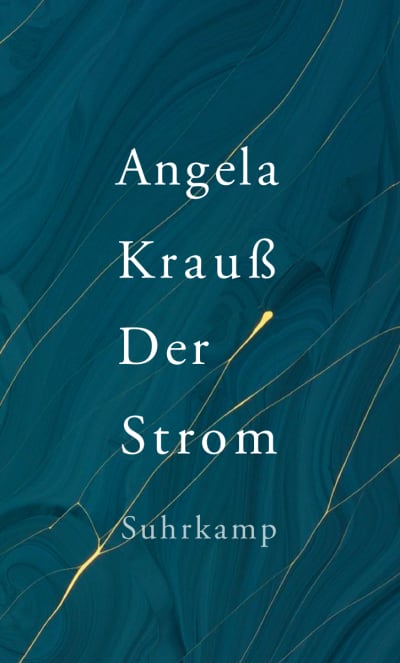Flow
Poetic existence unfolds in Angela Krauß’ magical language, a language in which reality vibrates – and dreams become tangible.
It’s summer. The poet is having lunch in her spot next to the piano, her patron is playing tennis seventeen hours away by plane, the owner of the French restaurant always serves her himself. The olives are black, hard, and sharp. This sensual reference to the world stands in contrast to an ascetic existence to which no one is allowed...
Poetic existence unfolds in Angela Krauß’ magical language, a language in which reality vibrates – and dreams become tangible.
It’s summer. The poet is having lunch in her spot next to the piano, her patron is playing tennis seventeen hours away by plane, the owner of the French restaurant always serves her himself. The olives are black, hard, and sharp. This sensual reference to the world stands in contrast to an ascetic existence to which no one is allowed access. Both habitats – the table and hermit’s cell – can be found in the backward part of the city, that area where thirty years ago they said: The Russians are gone. Just like the poet gathers together particles of memory and the future until there is a sudden compression, one night an unknown source of electricity shoots through her, as if to cast her out of her body with the intense pressure. It is time for her to pack up her things.
»Flow […] is neither story nor is it poetry but works like a kaleidoscope that creates changing, fragile images out of colourful fragments.« Jörg Magenau, Süddeutsche Zeitung
»Angela Krauß is the master of omission and accordingly also the master of allusion and she does so with perfect technique.« Sieglinde Geisel, Neue Zürcher Zeitung am Sonntag
»In her most recent work of prose, Flow, Angela Krauß is at the height of her prowess.« Der Tagesspiegel
»Indeed, Flow is more flow than narration, a stream of consciousness scattered into minuscule particles. […] Literary treasures like Rilke’s ›Archaic Torso of Apollo‹ […] and Goethe’s ›Everything Flows‹ sparkle through the narrative flow.« Deutschlandfunk Kultur
»Angela Krauß has conveyed the stream of life to a most delicate poetry. Recommended for readers who value literary feats.« MDR
»With this book, the author has created a prose that is open to what used to be called ›poetic prose‹ or ›poème en prose‹.« Deutschlandfunk
»Flow is poetic prose and at the same time it is a reflection on writing. The book delights its readers with the special delicacy of the language Angela Krauß uses to clad her observations in words.« WDR
»A literary highlight this year.« Wendt Kässens, Wiener Zeitung
»Flow invites you to shut out the world, to immerse yourself in another cosmos and eventually resurface delighted.« Leipziger Volkszeitung
»Angela Krauß articulates her profound observations and thought fragments in an intricate, delicately chased prose.« Schreibfertig
»The Leipzig-based author [Angela Krauß] has composed a lyrical masterpiece with her most recent work of prose.« Michael Ernst, SAX 5/2019
»Krauß presents a well-balanced combination of a highly-concentrated flow of prose and endless poetry – with exuberant imagery, quotes from many of the great poets of the past and profound references to Romanticism.« Peter Mohr, literaturkritik.de
»Flow […] is neither story nor is it poetry but works like a kaleidoscope that creates changing, fragile images out of colourful fragments.« Jörg Magenau, Süddeutsche Zeitung
»Angela Krauß is the master of omission and accordingly also the master of allusion and she does so with perfect technique.« Sieglinde Geisel, Neue Zürcher Zeitung am Sonntag
»In her most recent work of prose,...
DISCOVER
Spotlight on Authors from the Former East on German Unity Day
On German Unity Day, we’ve put together a collection of works by writers who were born or worked in East Germany.DISCOVER
Spotlight on Authors from the Former East on German Unity Day
On German Unity Day, we’ve put together a collection of works by writers who were born or worked in East Germany.Persons
Angela Krauß
Angela Krauß was born in 1950 and lives in Leipzig. Her books have won numerous prizes, including the Ingeborg Bachmann Prize and the Malkowski Prize. In 2004, she was the annual visiting lecturer on poetics at the University of Frankfurt/Main.
Angela Krauß was born in 1950 and lives in Leipzig. Her books have won numerous prizes, including the Ingeborg Bachmann Prize and the...
OTHER PUBLICATIONS

The World Building Must Be Erected. After All, We Have to Live Somewhere.

At Best
Secretly, this woman works, like...

What next
Sunday morning. The zoo animals are gradually awakening outside the narrator’s window. Her companion is still dreaming. On the floor, her tortoise Kastanorka is...

